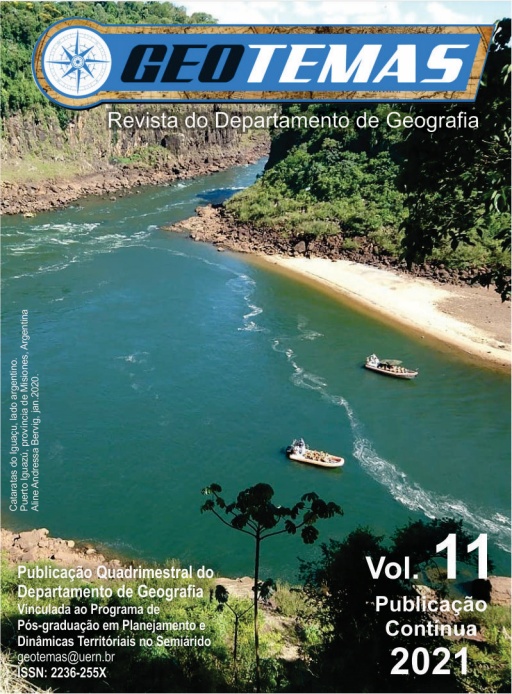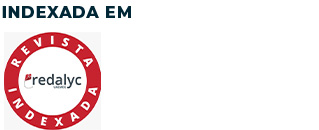CLIMATE ETHICS AND ANALYTICAL CATEGORIES: THEORETICAL-NORMATIVE POTENTIAL FOR POLICY MAKERS
DOI:
https://doi.org/10.33237/2236-255X.2021.2951Keywords:
Climate Ethics, SoSocio-Environmental Justice, Anthropocene, Climate PolicyAbstract
Climate ethics is one emerging force that has entered in the climate policy making arena. Different actors are proposing several policies for adapting and mitigating global warming. Recent research reveals that the current climate instruments are based mainly on technological and economic solutions, and more, they disregard or make invisible biogeocentric ethical principles. This article seeks to present the emerging of climate ethics within the latent theoretical field and its normative power.The methodological path adopted was through a qualitative approach, with systematic bibliographic review, documentary research and content analysis. In the first part of the article, the ontological rupture between the social and the natural is presented in the socio-climatic perspective. It also demonstrates how anthropocentric ethical principles are associated with the devastation of Nature, as well as they are being mobilized by strategies like negationism and techno-salvationism in climate policies. In the second part, I discuss the morality of the normative elements of this emerging ethics. In the third part, a synthesis of the analytical categories of the emerging climate ethics is presented. I conclude by presenting the real potential for both theoretical expansion of the field of climate ethics and normative categories for use in the processes of formulating climate policies.
Downloads
References
ABDENUR, A. E.; KUELE, G.; AMORIM, A. (eds.). Clima e Segurança na América Latina e Caribe. Instituto Igarapé; Instituto Clima e Sociedade, 2019.
ACOSTA, A.; BRAND, U. Pós-extrativismo e decrescimento: saídas do labirinto capitalista. Editora Elefante, 2018.
ATTERIDGE, A.; STRAMBO, C. Seven principles to realize a just transition to a low-carbon economy. Stockholm Environment Institute Policy Report, p. 1-20, 2020. Disponível em: <https://www.sei.org/wp-content/uploads/2020/06/seven-principles-for-a-just-transition.pdf>. Acesso em: 22 mar. 2021
BAPTISTA, I. M. C. Ética, moral e deontologia. Cadernos do CCAP, Lisboa, n. 3, p. 5-16, 2011.
BARDIN, L. Análise de Conteúdo. Lisboa: Edições 70, 2008.
BLANCO-WELLS, G.; GÜNTHER, M. G. De crisis, ecologías y transiciones: reflexiones sobre teoría social latinoamericana frente al cambio ambiental global. Revista Colombiana de Sociología, v. 42, n. 1, p. 19-40, 2019. Disponível em: <http://dx.doi.org/10.15446/rcs.v42n1.73190>. Acesso em: 12 mar. 2021
BOLTANSKI, L.; THÉVENOT, L. On justification: Economies of worth. Princeton University Press, 2006 [1991].
CAILLÉ, A.; VANDENBERGHE, F. Neo-classical sociology: The prospects of social theory today. European Journal of Social Theory, p. 1–18, 2015. Disponível em: <https://doi.org/10.1177%2F1368431015590290>. Acesso em: 12 mar. 2021
CE - Comissão do Parlamento Europeu, ao Conselho Europeu, ao Conselho, ao Comité Económico e Social Europeu e ao Comité das Regiões. A Hora da Europa: Reparar os Danos e Preparar o Futuro para a Próxima Geração. Bruxelas: Comissão Europeia, 2020
CEBALLOS, G.; EHRLICH, P. R.; DIRZO, R. Biological annihilation via the ongoing sixth mass extinction signaled by vertebrate population losses and declines. Proceedings of the National Academy of Sciences, v. 114, n. 30, p. E6089-E6096, 2017. Disponível em https://doi.org/10.1073/pnas.1704949114 Acesso em 30 mar. 2021.
CHOMSKY, N.; POLLIN, R. Climate Crisis and the Global Green New Deal: The Political Economy of Saving the Planet. Londres, Nova Iorque: Verso, 2020.
COSTA, S. The neglected nexus between conviviality and inequality. Mecila Working Paper Series, n.17, 2019. Disponível em: <https://doi.org/10.25091/s01013300201900010003>. Acesso em: 23 mar. 2021.
DI GIULIO, G. M. et al. Bridging the gap between will and action on climate change
adaptation in large cities in Brazil. Regional Environmental Change, v. 19, n. 8, p. 2491-
, 2019 Disponível em: <https://doi.org/10.1007/s10113-019-01570-z>. Acesso em 31 mar. 2021
DOWBOR, L. O capitalismo se desloca: novas arquiteturas sociais. São Paulo: SESC, 2020.
ENGAJAMUNDO. Quem somos. Disponível em: <https://www.engajamundo.org/sobre/#quem-somos>. Acesso em: 02 jan. 2021.
FAO - Food and Agriculture Organization of the United Nations et al. The State of Food Security and Nutrition in the World 2020. Roma: FAO, 2020. Disponível em: <https://doi.org/10.4060/ca9692en>. Acesso em: 22 jan. 2021.
FARAN, T. S.; OLSSON, L. Geoengineering: neither economical, nor ethical "” a risk–reward nexus analysis of carbon dioxide removal. International Environmental Agreements: Politics, Law and Economics, v. 18, n. 1, p. 63-77, 2018. Disponível em: <https://link.springer.com/article/10.1007/s10784-017-9383-8>. Acesso em: 22 fev. 2021.
FARMER, J. Technofossil. In: Future remains: a cabinet of curiosities for the Anthropocene. Mitman, Gregg; Armiero, Marco; Emmett, Robert S. Chicago, Londres: The University of Chicago Press, 2017.
FLEURY, L. C.; MIGUEL, J. C. H.; TADDEI, R. Mudanças climáticas, ciência e sociedade. Sociologias, v. 21, n. 51, p. 18-42, 2019. Disponível em: <https://doi.org/10.1590/15174522-0215101>. Acesso em: 11 jan. 2021.
FLORIT, L. F. From environmental conflicts to socio-environmental ethics: An approach from the traditional communities"™ perspective. Desenvolvimento e Meio Ambiente, v. 52, pp. 261–283, 2019. DOI: http://dx.doi.org/10.5380/dma.v52i0.59663
FORST, R. The justification of basic rights: A discourse-theoretical approach. Netherlands Journal of Legal Philosophy, v. 45, n. 3, p. 7-28, 2016. Disponível em: <https://doi.org/10.5553/NJLP/221307132016045003002>. Acesso em: 24 mar. 2021.
GARDINER, S. M. Climate ethics in a dark and dangerous time. Ethics, v. 127, n. 2, p. 430-465, 2017. Disponível em: <https://www.journals.uchicago.edu/doi/abs/10.1086/688746?journalCode=et>. Acesso em: 31 mar. 2021.
GIDDENS, A. As consequências da modernidade. São Paulo: Ed.UNESP, 1991.
GUDYNAS, E. Direitos da natureza: ética biocêntrica e políticas ambientais. Editora Elefante, 2020.
HARAWAY, D. J. Staying with the trouble: Making kin in the Chthulucene. Duke University Press, 2016.
INTERNACIONAL CONVIVIALISTA. Segundo Manifesto Convivialista: por um mundo pós-neoliberal. Rio de Janeiro: Ateliê das Humanidades, 2020.
INVISíVEL, Comitê. Aos nossos amigos: crise e insurreição. São Paulo: n-1 edições, 2018.
IPCC - Intergovernmental Panel on Climate Change. Summary for Policymakers. In: Global Warming of 1.5°C. An IPCC Special Report on the impacts of global warming of 1.5°C above pre-industrial levels and related global greenhouse gas emission pathways, in the context of strengthening the global response to the threat of climate change, sustainable development, and efforts to eradicate poverty. IPCC, 2018. Disponível em: <https://www.ipcc.ch/sr15/>. Acesso em: 24 jan. 2020.
KANT, I.; QUINTELA, P. Fundamentação da metafísica dos costumes. 2007 [1786].
KOEFOED, L.; NEERGAARD, M. de.; SIMONSEN, K. Cross-cultural Encounters in Urban Festivals: Between Liberation and Domination. Space and Culture, p.01–14, 2020. Disponível em: <https://doi.org/10.1177/1206331219897036>. Acesso em: 20 mar. 2021.
KOTHARI, A. et al. Pluriverse. A Post-Development Dictionary. New Dehli: Tulika Books, 2019.
LACROIX, K.; GIFFORD, R. Psychological barriers to energy conservation behavior: The role of worldviews and climate change risk perception. Environment and Behavior, v. 50, n. 7, p. 749-780, 2018. Disponível em: <https://doi.org/10.1177/0013916517715296>. Acesso em: 31 mar. 2021.
LATOUCHE, S. Pequeno tratado do decrescimento sereno. São Paulo: WMF Martins Fontes, 2009.
LEMOS, M. C.; KIRCHHOFF, C. J.; RAMPRASAD, V. Narrowing the climate information usability gap. Nature Climate Change, v. 2, n. 11, p. 789-794, 2012. Disponível em: <http://www.iai.int/admin/site/sites/default/files/uploads/Lemos-et-al_Narrowing-the-climate-Information-Usability-Gap_2012.pdf>. Acesso em: 21 mar. 2021.
LEZAMA, J. L. La naturaleza ante la triada divina: Marx, Durkheim, Weber. Ciudad de México: El Colegio de México, Centro de Estudios Demográficos, Urbanos y Ambientales, 2019.
LOPES, W. E. S. A ética da responsabilidade é um caminho para encarar a crise ecológica e os dilemas de nosso tempo. Revista do Instituto Humanitas Unisinos - IHU, n.540, p.30-40, 2019.
MARTINS, P. H. Pensando heterotopías no contexto pós-colonial: convivialismo, amor e bem comum. Controversias y Concurrencias Latinoamericanas, v.10, n.18, p.159- 171, 2019. Disponível em: <http://ojs.sociologia-alas.org/index.php/CyC/article/view/97> Acesso em: 31 mar. 2021.
MITMAN, G.; ARMIERO, M.; EMMETT, R. (eds). Future Remains: a cabinet of curiosities for the anthropocene. Chicago, Londres: University of Chicago Press, 2017.
MOCELIN, D. Quatro olhares fundadores. Porto Alegre: CirKula, 2017.
MORTON, T. Being ecological. Cambridge: MIT Press, 2018.
OTTO, I. et al. Social tipping dynamics for stabilizing Earth"™s climate by 2050. PNAS, v. 117, n. 5, p. 2354–2365, 2020. Disponível em: <https://doi.org/10.1073/pnas.1900577117>. Acesso em: 20 fev. 2021.
PAYNE, H. Pulling in Both Directions: How States Are Moving Toward Decarbonization While Continuing to Support Fossil Fuels. Columbia Journal of Environmental Law, v.45, n.S, p.285-330, 2020. Disponível em: <https://academiccommons.columbia.edu/doi/10.7916/d8-sf1h-zr50/download>. Acesso em: 20 fev. 2021.
REBELLION, E. This is not a drill. Londres: Penguin, 2019.
RICOEUR, P. Oneself as another. Chicago e Londres, University of Chicago Press, 1992 [1990].
ROSS, C. The time is now. In: This is not a drill. REBELLION, Extinction. Londres: Penguin, 2019. p.179-180.
SALMI, F. Pequeno léxico convivialista: instrumento de transformação sociológica. Revista Contraponto, v.7, n.1, p. 89-102, 2020. Disponível em: <https://seer.ufrgs.br/contraponto/article/view/102390> Acesso em: 31 mar. 2021.
SALMI, F. A emergente ética climática como instrumento de reordenamento sociopolítico. In: Problemas socioambientais emergentes: contribuições teóricas e práticas. TEIXEIRA, Rylanneive (org.). São Paulo: Gradus, 2021. No prelo.
SAVATER, F. Coragem para viver, generosidade para conviver e prudência para sobreviver. In: 21 ideias do Fronteiras do Pensamento para compreender o mundo. Shûler, Fernando; Wolf, Eduardo (orgs.). Porto Alegre: Arquipélago, 2017, p.187-193.
SETHI, M. et al. Climate change mitigation in cities: a systematic scoping of case studies. Environmental Research Letters, v. 15, n. 9, p. 093008, 2020. Disponível em: <https://iopscience.iop.org/article/10.1088/1748-9326/ab99ff/meta>. Acesso em: 03 mar. 2021.
SWINBURN, B. et al. The Global Syndemic of Obesity, Undernutrition, and Climate Change: The Lancet Commission report. The Lancet, v.393: p.791–846, 2019. Disponível em: <https://doi.org/10.1016/S0140-6736(18)32822-8>. Acesso em: 31 mar. 2021.
TEIXEIRA, R. L. P.; PESSOA, Z. S.; DI GIULIO, G. M. Mudanças climáticas e capacidade adaptativa no contexto da cidade do Natal/RN, Brasil. GEOTemas, v.10, n.1, p. 95-115, 2020. Disponível em: <http://natal.uern.br/periodicos/index.php/GEOTemas/article/download/1824/1955>. Acesso em: 31 mar. 2021.
THE GREAT Green Wall. Direção de Jared P. Scott. Londres: Make Waves, 2019. 1 vídeo (92 min.). Disponível em <https://www.greatgreenwall.org/film>. Acesso em: 24 mai. 2020.
TORRES, P. H. C.; LEONEL, A. L.; ARAÚJO, G. P.; JACOBI, P. R. Is the Brazilian National Climate Change Adaptation Plan Addressing Inequality? Climate and Environmental Justice in a Global South Perspective. Environmental Justice, v.00, n.00, 2020. Disponível em: <https://doi.org/10.1089/env.2019.0043>. Acesso em: 20 fev. 2021.
TREMMEL, J. C.; ROBINSON, K. Climate ethics: Environmental justice and climate change. Bloomsbury Publishing, 2014.
THUNBERG, G. After 2 years of school strikes, the world is still in a state of climate crisis denial. [S.l.], 19 ago. 2020. Twitter: @GretaThunberg. Disponível em: <http://twitter.com/GretaThunberg/status/>. Acesso em: 19 ago. 2020.
UDOH, U. P.; ESSIEN, A. U.; ETTEH, D. I. The Importance of Urban Design and Sustainable Urban Transformation in Nigeria. IOSR Journal Of Humanities And Social Science (IOSR-JHSS), v. 25, n. 6, p 01-07, 2020. Disponível em: <https://doi.org/10.9790/0837-2506060107>. Acesso em: 11 jan. 2021.
UN - United Nations. Department of Economic and Social Affairs Population Dynamics: World Population Prospects 2019. Disponível em: <https://population.un.org/wpp/Graphs/Probabilistic/POP/TOT/900>. Acesso em: 14 mar. 2021.
VANDENBERGHE, F. Sociology as Practical Philosophy and Moral Science. Theory, Culture & Society, v.35, n.3, p. 77–97, 2018. Disponível em: <https://doi.org/10.1177/0263276417709343>. Acesso em: 22 jan. 2021.
Downloads
Published
How to Cite
Issue
Section
License
Copyright (c) 2021 JOURNAL GEOTEMAS

This work is licensed under a Creative Commons Attribution-NonCommercial 4.0 International License.
Authors who submit their manuscripts to Geotemas declare that the work is an original article and has not been submitted for publication, in full or in part, in another national or international scientific journal or in another circulation vehicle. The authors also declare that they agree with the transfer of the copyright of the referred article to the magazine Geotemas (University of the State of Rio Grande do Norte), allowing for later publications, as long as the source of its publication is assured. Finally, they assume public responsibility for the article, being aware that any charges arising from a claim by third parties regarding the authorship of the work may apply to them.





















